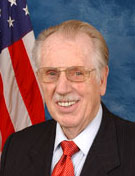The Next Conservative Energy Policy

|
February 27, 2006 |

|
February 27, 2006 |
"Delayed gratification and self-sufficiency are traditional conservative
values. That is why the next conservatism should champion policy changes to use
less, not more oil through conservation and energy efficiency."
- Rep. Roscoe G. Bartlett
Current U.S. energy policy and the President's Advanced Energy Initiative are
too modest and overly focused on the goal of increasing domestic production of
oil and alternatives to support increasing oil consumption. This is futile and
self-defeating because U.S. oil production is in permanent decline and world oil
production will follow - perhaps disastrously soon.
American Shell Oil scientist M. King Hubbert identified "peak oil" in the
mid-1950s. He discovered oil field production follows a bell curve rising to a
maximum capacity, or peak, when about half of the oil is extracted, after which
production declines. U.S. oil production peaked in 1971 and has declined every
year since. The U.S. has only two percent of world oil reserves. We contribute
eight percent of world production. But we consume 25 percent of world oil
production. We're pumping our reserves four times faster than the rest of the
world. U.S. natural gas production has also peaked. The United States is now the
world's largest importer of both oil and natural gas. From importing one-third
of the oil we use before the Arab Oil Embargo in 1973, we now import about
two-thirds of the oil we use.
Hubbert was right about the U.S. What about the world? Oil production is
declining in 33 of the world's 48 largest oil-producing countries. Experts agree
global peak oil is inevitable. Many predict it is imminent. Oil prices have not
predicted peak production. Neither high oil prices nor technological advances
have reversed production declines after peak. Despite periods of high prices and
new technologies, world oil discoveries have steadily declined for 40 years.
With U.S. oil production declining, increasing oil consumption will make America
more dependent upon oil imports from foreign sources such as Saudi Arabia,
Russia, Nigeria and Venezuela. Increasing oil consumption will increase
competition and potential conflict with other energy consumers, such as China
and India. Increasing oil consumption will make us less prepared and capable to
overcome the inevitable challenges of global peak oil.
Peak oil will cause a crisis in transportation because there are no ready liquid
fuel substitutes of comparable quality or quantity. We can't fill gas tanks with
coal, wind, solar or nuclear fuel. A February 2005 report commissioned by the
Department of Energy, Peaking of World Oil Production: Impacts, Mitigation and
Risk Management, concluded that a crash program to produce liquid fuel
alternatives at the maximum feasible rate must start twenty years before peak to
avoid significant supply shortages. Oil prices haven't promoted those
alternatives. In the Wall Street Journal on January 10, 2006, Marc Sumerlin,
formerly Deputy Director of President Bush's National Economic Council, noted
that investment in alternatives to oil was stymied by $20/barrel futures market
prices for oil between 1986 and 2003 and fears of a repeat of the 1998 plunge
down to $10/barrel.
$70/barrel oil and $3.50/gallon gas will seem cheap after global peak oil. In
its September 6, 2005 report, Oil Shockwave, the National Commission on Energy
Policy & Securing America's Future Energy projected that a sustained four
percent global shortfall in daily oil supply would raise oil prices above $160
per barrel. Prices that high would inflict a ruinous worldwide recession.
Technology and alternatives are important. However, unless we also use less oil,
we won't reduce America's oil imports. Delayed gratification and
self-sufficiency are traditional conservative values. That is why the next
conservatism should champion policy changes to use less, not more oil through
conservation and energy efficiency. Conservatives should recognize that unless
we have a national energy conservation program with the commitment, breadth and
intensity of the Apollo moon mission and the Manhattan Project to create the
atom bomb, our country is unlikely to achieve the goal of replacing "more than
75 percent of our oil imports from the Middle East by 2025" and even less likely
to break our oil addiction.
Roscoe G. Bartlett, a Republican, represents the Sixth District of Maryland
in the U.S. House of Representatives.
Copyright © 1999 - 2005 - RenewableEnergyAccess.com
Please visit www.RenewableEnergyAccess.com for great coverage on energy today!!
The information and views expressed in this article are those of the author and not necessarily those of RenewableEnergyAccess.com or Arizonaenergy.org or the companies that advertise on its Web site and other publications.